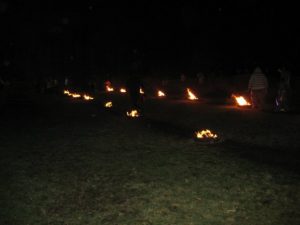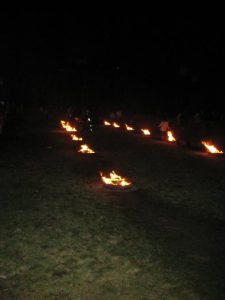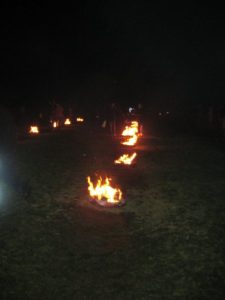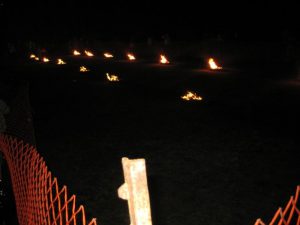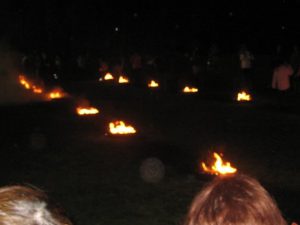Every year, the last Tuesday of the last week, before the Iranian New Year, we Iranians / Persian / Farsi communities, we celebrate. In the evening of Tuesday, it is our time to jump over fire. We name this event as Chahar-Shanbeh-Sori or Wednesday-party, while the party is really on in the Tuesday evening. This is a community event where people are invited to come together and celebrate something bigger, the reality of a burning fire. This event contains enjoyment of here and now while future health is in the main focus.
It sounds complicated, however this tradition is forward looking and we celebrate it in the last Tuesday to look forward for the Wednesday when spring is getting closer. I guess we Iranians have always lived our life by looking forward for a better future since Chahar-Shanbe-Sori is the time for getting ourselves warm by doing some extra activities and physical exercises. This is a time for appreciating fire and this is a time for asking fire for our redness.
Somehow, I guess in the past, in our ancient time, after a long winter people celebrated the coming spring by putting a nice fire together. We could say in the light of a big fire, we manage to put things into a context.
We create some meaning and reason for what we do and what we are going to do in a near future, by communicating in the light of the flames. If we do not have anyone to talk to, at least we have the fire or the flames. Making a wish or praying while jumping over the small flames does not mean we are crazy, this is a tradition and we let go of our yellowness while asking for the fire’s redness.
Chahar-shanbe- Sori is the evening for connecting ourselves to the ancient history of hope. Through the lens of a clinical perspective, we could say that our, Chahar-shanbe- Sori is a really interesting occasion for looking forward for physical, emotional, and spiritual health in addition to a holistic well-being.
By understanding the real meaning of Chahar-shanbe- Sori, we might be able to be grateful for the culture that has been passed down to us in a new light.
Without a doubt, Chahar-shanbe Sori prepare us for the spring. How? Our ancestors appreciated fire, because fire is about life, a reason for Chahar-shanbe- Sori having a connection to health, hope, and prosperity.
We leap over fire to let go of what is ill in us, whether physical illness or mental distress.
We communicate with the fire by singing a song for it and asking fire to donate its warmth to us.
We converse with our universe because this is a time of moving ourselves beyond what is ill or bad. This beautiful ancient Persian / Iranian tradition creates a collective culture, a community that can share fire and the joy of living life around its warmth.
This tradition is about valuing spirituality and connection to life.
Chahar-Shanbe-Sori a culturally based tradition that has survived though folklores, stories, metaphors, art, literature, poetry, faith, and scripted material.
This is most certainly a school of thought that has deep humanistic tone.
Chahar-Shanbeh-Sori speak to us, has a voice telling us that we are all part of the human world and we are connected to our mother earth.
Idea behind this tradition is that we let go of excuses, anger, revenge, misery, conflicts, and blame.
Fire knows its duty; to burn down all those hard emotions.
We are confident that fire will then give us its glow and love.
It is in that moment of love that we find relief, we evaluate our values, we pay attention, we realize our bonds, and we find forgiveness.
Chahar-Shanbe-Sori is the most dynamic and exciting tradition in which, in one moment of jumping over the flames of the fire, many magic things occur. We find health.
This is how our Iranian culture has survived and will survive.
Most certainly we Iranian have a tradition and a culture to be proud of, because it is about peace, joy, and life.
May you find health and prosperity by giving your poor health to the burning flames of a beautiful fire.
Happy Chahar-Shanbe-Sori
Poran Poregbal
March 8, 2009
www.middlepeace.com
